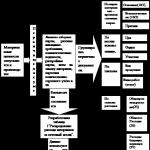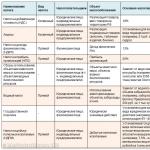Income tax in 2019 did not undergo major legal transformations - its amount is in the range of 9-35% from personal taxes. The average indicator is an income tax in the amount of 13% of the income of individuals when receiving a salary or material benefits from the sale or lease of property.
Income tax in 2019: trends and risks
Income tax is the main type of direct tax, according to which individuals or legal entities pay a certain percentage of their documented legal income.
Income tax in 2019 has not been upgraded. To cover the budget deficit, the government decided to use its reserves more efficiently, rather than increase the taxation of citizens.
Specifics of income tax calculation in 2019
Income tax is considered a form of direct taxation of individuals when they receive natural or monetary benefits. Income tax in 2019 superimposed on:
- Wages, bonus payments and other forms of employee remuneration.
- Profit received from the results of investment or shareholding activities.
- Benefits from the sale of intellectual property.
- Cash rewards due for the lease of immovable or movable property to other individuals or legal entities for temporary use.
- Income from the sale of securities or excise papers, as well as real estate.
- Benefit from lottery winnings and competitive prizes.
- Benefits for tax non-residents of the Russian Federation.
- Other benefits received within the territorial limits of the Russian Federation by its tax residents or non-residents.
Income tax rates in 2019
The income tax rate is a percentage of the income of individuals.
Percent income tax in 2019 remained at 13%. This stability contributes to the maintenance of legal employment and legitimate business in the country.
Income tax in 2019 in the amount of 35% is deducted when:
- Receipt of prizes and winnings exceeding the established sizes.
- Obtaining excess income on interest savings from bank deposits.
- Receipt by the taxpayer of a material loan with interest savings exceeding the established norms.
In the amount of 30% income tax in 2019 will have to pay tax non-residents of the Russian Federation. This amount will be deducted in the form of profit from equity participation in the functioning of Russian business structures.
The minimum income tax rate in 2019 (13%) will have to be paid by citizens who received income as a result of the purchase of mortgage-backed securities that were issued before January 1, 2007.
To resolve controversial issues in the system of taxation of citizens, it is worth seeking qualified legal advice. The help of an experienced lawyer is provided by phone and online, so you can solve problems with tax deductions without getting up from the couch.
Editor: Igor Reshetov
Personal income tax (PIT) is the main direct tax levied on personal income. Personal income tax plays an important role in filling the budget, as it ensures a constant flow of funds to the state treasury.
In connection with the crisis, the issue of increasing this fee is becoming increasingly important, because with the growth of tax rates, budget revenues will also increase. So, according to the calculations of the Ministry of Finance, in 2017, income from personal income tax should be close to 3.4 trillion. rubles, and raising the tax by 2% will increase this value by 0.5 trillion. rubles.
However, experts in the field of economics are sure that personal income tax in 2017 will remain at the same level and will not increase until the elections in 2018. Raising tax rates is a very unpopular decision, which the authorities are unlikely to decide on, fearing the loss of votes in the election race. However, already in 2019, personal income tax may well increase to 15%.
Personal income tax rates for 2017
In Russia, there is a flat taxation scale - the personal income tax rate is the same for all citizens, regardless of income level. Base rates for 2017 will be as follows:
- 13% - for income of citizens of the Russian Federation from labor activity and received dividends, as well as for citizens of the EAEU, refugees and immigrants working in the territory of the Russian Federation;
- 30% - for citizens of other countries (non-residents) who are engaged in entrepreneurial or labor activities in Russia;
- 35% - for winnings and income on deposits.
However, many experts call this method of taxation inefficient and insist on a return to the progressive system that operated in Russia from 1992 to 2000.
Such a system provides for the establishment of a tax rate depending on the level of income of citizens - the more a person earns, the more she must deduct to the treasury. The progressive method of taxation operates in many developed countries of the world, in particular in Germany and France.
The introduction of a progressive system is supported by many deputies, pointing out that it will help reduce social tension. Its return will help balance the tax burden, since in this case the increase in the personal income tax rate will affect only Russians with the highest incomes, and will not affect low-income categories of the population.
Corresponding proposals have already been submitted to the State Duma for consideration, but they did not find much support. Opponents of the initiative say that a progressive taxation system could lead to evasion and, consequently, a reduction in budget revenues.
Officials emphasize that it was for this reason that in 2000 the authorities had to switch to a flat taxation scale.
When to expect a tax increase
 Government officials recognized back in 2014 that raising tax rates is a necessary step to balance the budget. In a crisis, an increase in the level of fees will support regional budgets and increase the revenue side of the treasury.
Government officials recognized back in 2014 that raising tax rates is a necessary step to balance the budget. In a crisis, an increase in the level of fees will support regional budgets and increase the revenue side of the treasury.
Previously, the authorities limited themselves to raising the tax burden on certain industries, but the fall in the economy made officials seriously think about raising taxes such as VAT and personal income tax.
At the same time, the government does not dare to take such a step, “stretching out” the decision until the end of the elections in 2018. It is the approach of the vote, according to political scientists, that holds back the growth of tax rates, since the authorities are afraid of losing the votes of the electorate.
Experts are convinced that personal income tax will remain at the level of 13% until 2018, after which it may be raised to 15%.
In addition, the government understands that the crisis has had a very negative impact on the real incomes of citizens, and a tax increase in such conditions will “push” many Russians over the poverty line. Therefore, the authorities postpone unpopular decisions until the moment when the situation in the economy stabilizes and GDP indicators return to the growth stage again.
Expert opinion
Business representatives and economic analysts are skeptical about the initiative to increase personal income tax. In theory, raising tax rates should increase budget revenues, but in reality the result may be the opposite.
With an increase in the burden on wages, the purchasing power of citizens will decrease, and many Russians will try to evade paying the fee. Moreover, the income of individuals may again go into the "shadow", since it will be more profitable for employees to receive money in envelopes.
 Experts note that with the increase in taxes, the authorities should also raise social standards. Requiring citizens to give part of their income to the treasury, the state must provide high-quality social services and be responsible to taxpayers. Only in this case the increase in taxes will not lead to social protest.
Experts note that with the increase in taxes, the authorities should also raise social standards. Requiring citizens to give part of their income to the treasury, the state must provide high-quality social services and be responsible to taxpayers. Only in this case the increase in taxes will not lead to social protest.
According to many analysts, in order to balance the budget, the government should, first of all, reduce inefficient spending and start looking for stable sources of replenishment of the treasury.
Increasing tax rates and cutting social benefits are ad hoc measures that can temporarily support the budget, but are not able to solve the problem of increasing its revenue side. The only right decision is to develop the economy and maintain business, since only this can ensure reliable budget revenues in the long term.
Be that as it may, the issue of personal income tax growth remains quite “acute”. Politicians are very cautious in the problem of raising taxes and postponing the decision to the last moment. In 2017, personal income tax rates will remain at the same level, but the government makes it clear that they will soon return to the discussion of raising them.
It needs to be multiplied by the bet. The amount of the personal income tax rate depends on the type of income and on whether the payer is a tax resident of the Russian Federation or not (clauses 2-3 of article 207 of the Tax Code of the Russian Federation). For example, how many percent of the salary you have to pay to the budget depends on the tax status of the employee.
You will find the personal income tax rates applicable to the most common types of income in 2020 in the tables below.
Personal income tax rates for residents
Personal income tax rates for non-residents
| Type of income | The amount of the personal income tax rate (Article 224 of the Tax Code of the Russian Federation) |
|---|---|
| Labor income: — for visa-free migrants; — for residents of the EAEU member countries; – for highly qualified foreign specialists; - for refugees | 13% |
| Employment income for all other non-residents | 30% |
| IP income from entrepreneurial activity | 30% |
| Income from the sale of property (real estate, vehicles, etc.) | |
| Dividends | 15% |
| Interest income on deposits | 30% |
| Income from savings on interest when obtaining borrowed funds (for example, when obtaining a loan, the interest on which is set below the refinancing rate of the Central Bank of the Russian Federation) | |
| Prizes, winnings (in excess of 4,000 rubles (clause 28, article 217 of the Tax Code of the Russian Federation)) |
Tax rates of personal income tax in the certificate 2-personal income tax
If a tax agent accrued to an individual during the year income taxed at different personal income tax rates, Sections 1, 2 and 3 (if necessary), as well as the Appendix "Information on income and corresponding deductions by months of the tax period" are filled out for each of the rates (p .1.19 of the Procedure (Appendix No. 2), approved by Order of the Federal Tax Service dated 02.10.2018 No. ММВ-7-11/ [email protected]).
Keep in mind, even if an individual in 2-NDFL has citizenship - the country of Russia, the personal income tax rate is not necessarily applied as for residents. After all, a Russian citizen at the end of the year may well turn out to be a non-resident.
Tax deductions for children
Some clarifications have been made to the definition of tax payments from individuals for minor children in the care of the taxpayer. They apply to children under the age of 18, and if they study at a university or vocational school, the benefit period is extended until they reach the age of 24 or graduate from an educational institution.
In 2017 they are provided:

These deductions are as follows::
Attention! It should be remembered that the established deductions do not apply to the spouses of guardians of children with disabilities.
When determining the amount of the tax deduction, the total number of children in the family (including adopted children not adopted by the second spouse) is taken, even if they have reached the age of 18 years.
At the same time, one of the parents has the right to file an application for waiver of tax payments at the place of work. Then the other parent enjoys the right to a double increase in tax deductions from his income. This is beneficial if the salaries of the spouses differ significantly in amount. Single parents, adoptive parents, and guardians are entitled to a two-fold increase in deductions.
In accordance with
deductions are allowed to "accumulate" during those periods when the taxpayer had no income:
- During maternity leave;
- During parental leave up to 3 years;
- During the period of official registration as unemployed.
At the end of this period, the accumulated interest on deductions is summed up and taken into account for taxation upon the resumption of work and income.
Social deductions
These income tax benefits are planned for employees who improve their qualifications / train in their specialty at their own expense. Their maximum amount will be 120,000 rubles / year.
In 2017, total deductions for education/treatment can be doubled from 0,100,000 to 200,000 rubles/year, and deductions for a child's education up to 100,000 rubles/year can be added.
Progressive taxation scale
If the bill is adopted, the changes will affect citizens who will be exempted from paying income tax of 13% - if their total annual income does not exceed 180,000 rubles.
- Those with an income of 180,000 to 2,400,000 rubles / year will be required to pay a standard tax on their salary - 13%.
- From 2,400,000 to 100,000,000 rubles / year - 30% of the amount over 2,400,000 rubles;
- Over 100,000,000 rubles / year - 70% of the amount over 100,000,000 rubles.
Taxes on the sale of an apartment
In order to combat real estate speculation, it is planned to increase the period during which the citizen who bought it will be required to pay a tax of 13% of the cadastral value.
The calculation will be carried out according to the formula:
cadastral value x 0.7 x 13% = tax rate
From now on, the cost specified in the contract will not be taken into account. The extended period will only apply to apartments purchased after January 1st.
No tax will be levied on apartments that have become property as a result of a gift or inheritance from direct relatives. They can be sold after 3 years of ownership without taxation.
Basis and legal basis for personal income tax
Personal income tax (abbreviated personal income tax)- this is a tax that applies to absolutely everyone, because we are all individuals. Its older, more common and familiar name is "income tax". Both of these names are speaking: they contain two main meanings of the tax:
- This tax is levied on income
- this tax applies to individuals.
Individuals in this case are citizens of Russia and foreigners, adults and children, men and women, that is, absolutely everyone. The main thing is that if an individual has income, then it should be taxed.
Chapter 23 of the Tax Code of the Russian Federation is devoted to personal income tax. Also, the legal framework for personal income tax includes Federal Law of July 3, 2016 N 251-FZ, Federal Law of November 25, 2009 N 281-FZ, Federal Law of July 27, 2010 N 229-FZ, Federal Law of December 29, 2012 N 279-FZ , Order of the Federal Tax Service of the Russian Federation of October 30, 2015 N MMV-7-11 / [email protected] and, of course, explanatory letters from the Ministry of Finance and the Federal Tax Service of the Russian Federation.
PIT taxpayers
Two categories of individuals are recognized as payers of personal income tax:
- Individuals - tax residents of the Russian Federation.
- Individuals - non-residents who receive income in the Russian Federation.
Who are tax residents and non-residents?
Tax residents are individuals who actually stay in the Russian Federation for at least 183 calendar days within 12 consecutive months. This period is not interrupted in cases of leaving the Russian Federation for short-term (less than six months) treatment or training, as well as for the performance of labor or other duties related to the performance of work or the provision of services at offshore hydrocarbon fields.
Non-residents are, respectively, persons who stay in Russia for less than 183 consecutive days. These can be foreigners who came for temporary work, exchange students, and even Russian citizens who live in another country for more than 6 months a year.
Important!
The presence or absence of Russian citizenship in itself is not a factor that plays a decisive role in determining the status of a tax resident. Here it is important to stay on the territory of Russia for 183 days or less.
Exceptions are two:
Paragraph 3 of Article 207 of the Tax Code of the Russian Federation says that, regardless of the actual time spent in Russia, Russian military personnel serving abroad, as well as employees of state authorities and local governments seconded to work outside the country, are recognized as tax residents of the Russian Federation.
Object of personal income tax
Object of taxation income of natural persons is recognized:
- tax residents - from sources in the Russian Federation and abroad;
- tax non-residents - from sources in the Russian Federation.
Recall that the income of an individual is recognized as an economic benefit in cash or in kind (this is stated in Article 41 of the Tax Code of the Russian Federation). This economic benefit is recognized as income when it meets three conditions:
- it is subject to receipt by money or other property;
- its size can be estimated;
- it can be determined according to the rules of Ch. 23 of the Tax Code of the Russian Federation.
Types of taxable income received from sources in the Russian Federation and abroad:
- dividends and interest;
- insurance payments;
- income from the use of copyright and other related rights;
- income from the lease or other use of property;
- income from the sale of real estate, shares and securities, shares in authorized capital, rights of claim, other property owned by an individual;
- remuneration for the performance of labor or other duties, work performed or services rendered, performance of certain actions, as well as remuneration of directors and payments received by members of the management body of the organization;
- pensions, scholarships and other similar payments;
- income from the use of any vehicles, as well as fines and sanctions received for their downtime;
- other income received from activities in the Russian Federation and abroad.
Types of taxable income received in the territory of the Russian Federation:
- remuneration and other payments for the performance of labor duties received by crew members of ships flying the State flag of the Russian Federation;
- income from the use of pipelines, power lines, other means of communication, including computer networks;
- payments to successors of deceased insured persons.
Some incomes are exempt from personal income tax - their list is indicated in articles 215 and 217 of the Tax Code of the Russian Federation. Read more about income exempt from personal income tax, see below.
Tax base for personal income tax
The tax base for personal income tax is the monetary value of the taxpayer's income. When determining the tax base, all incomes received both in cash and in kind, as well as in the form of material benefits, are taken into account. Various types of withholding income, including those by a court decision, do not reduce the tax base.
The tax base is determined separately for each type of income, for which different rates are established.
For income taxed at a rate of 13%, the tax base is determined as the monetary value of such income, reduced by the amount of tax deductions provided for in Art. 218-221 of the Tax Code of the Russian Federation. If the taxpayer's income is less than the deductions, the tax base is zero.
The tax base is always determined in rubles. Incomes (expenses accepted for deduction) expressed in foreign currency are recalculated into rubles at the exchange rate of the Central Bank of the Russian Federation established on the date of actual receipt of the said income (date of actual expenditure).
Information on the features of determining the tax base for various types of income is contained in Art. 211-215 of the Tax Code of the Russian Federation:
- If the income is received in kind, then we apply Article 211 of the Tax Code of the Russian Federation. Goods, property, services received are considered income in kind - everything that an individual receives in kind, and not in money. It is important that income in kind can be received by an individual only from an organization or an individual entrepreneur (if income in kind is received from another individual - not an individual entrepreneur, then such income is not taxed).
- Income in the form of material benefit may arise from savings on interest for the use of borrowed funds (credit), when purchasing securities, as well as when purchasing goods (works, services) under civil law contracts from individuals, organizations and individual entrepreneurs that are interdependent towards the taxpayer. These issues are regulated by Article 212 of the Tax Code of the Russian Federation.
- Features of determining the tax base for insurance contracts are considered in Article 213 of the Tax Code of the Russian Federation.
- Features of the payment of personal income tax on income from equity participation in the organization - in article 214 of the Tax Code of the Russian Federation.
- Separate incomes of foreign citizens and their taxation are considered in article 215 of the code.
tax rates
The general tax rate is 13%. It is levied on most of the income of a tax resident. These include, in particular, salary, remuneration under civil law contracts, income from the sale of property, as well as other income that is not specified in paragraphs. 2-5 article 224 of the Tax Code of the Russian Federation.
There are a number of cases when the income of a tax non-resident of the Russian Federation is also subject to a 13% rate:
- Income of foreign workers - highly qualified specialists.
- Income of foreigners working for individuals on the basis of a patent.
- Income of participants in the State program to assist voluntary resettlement in the Russian Federation of compatriots living abroad, as well as members of their families who jointly moved to permanent residence in Russia.
- Income of foreign citizens or stateless persons recognized as refugees or granted temporary asylum on the territory of the Russian Federation.
- Income from labor activity of crew members of ships flying the State Flag of the Russian Federation.
For certain types of income, special tax rates are provided - 9, 15, 30 and 35%.
Taxation at a rate of 9% is made in the following cases:
- when receiving interest on mortgage-backed bonds issued before January 1, 2007;
- upon receipt of income by the founders of trust management of mortgage coverage. Such income must be received on the basis of the purchase of mortgage participation certificates issued by the manager of mortgage coverage before January 1, 2007.
Taxation at a rate of 15% is made in relation to:
- dividends received from Russian organizations by individuals who are not tax residents of the Russian Federation.
Taxation at a rate of 30% is made in relation to:
- all income received by individuals who are not tax residents, with the exception of income for which special rates are set at 13% and 15%;
- income on securities issued by Russian organizations, the rights to which are recorded on a depo account of a foreign nominal holder, a depo account of a foreign authorized holder and (or) a depo account of depositary programs, paid to persons whose information was not provided to the tax agent.
Taxation at a rate of 35% is made in relation to:
- income from the value of any winnings and prizes received as a result of contests, games and other events for the purpose of advertising goods, works and services (tax is paid on the prize value over 4,000 rubles);
- interest income on bank deposits, in terms of their excess over the amount of interest calculated:
- for ruble deposits - based on the refinancing rate of the Central Bank of the Russian Federation, increased by 5%;
- for deposits in foreign currency - based on 9% per annum;
- income in the form of material benefits received from savings on interest on borrowed (credit) funds in excess of the amounts specified in paragraph 2 of Art. 212 of the Tax Code of the Russian Federation;
- income in the form of payment for the use of funds contributed by shareholders by a credit consumer cooperative;
- interest for the use of funds raised from shareholders in the form of loans by an agricultural credit consumer cooperative.
Income not subject to income tax
Some income is exempt from income tax. Their exhaustive list is provided for in Articles 215 and 217 of the Tax Code of the Russian Federation.
From January 1, 2017, Article 2017 of the Tax Code of the Russian Federation was supplemented with a new paragraph. Personal income tax is no longer charged on the cost of an independent assessment of an employee's qualifications. The changes are provided for by the Federal Law of July 3, 2016 N 251-FZ.
Income exempted from personal income tax, in particular, includes:
- State benefits, with the exception of temporary disability benefits (including benefits for caring for a sick child), other payments and compensations;
- Unemployment, pregnancy and childbirth benefits;
- State and labor pensions, social supplements;
- Compensation payments established by the legislation of the Russian Federation, constituent entities of the Russian Federation, decisions of local governments (within certain limits);
- Payments made to volunteers under civil law contracts, the subject of which is the gratuitous performance of work, the provision of services, to reimburse their expenses associated with the execution of such contracts - for housing, transport, food, etc.;
- Rewards for donor assistance (for donated blood, milk, etc.);
- Alimony;
- Grants (gratuitous assistance) to support science, education, culture, art in the Russian Federation, provided by international, foreign or Russian organizations specified in the Lists of the Government of the Russian Federation;
- International, foreign or Russian awards for outstanding achievements in science and technology, education, culture, literature and art, mass media:
- according to the approved list of the Government of the Russian Federation of February 6, 2001 N 89;
- according to the lists approved in the subjects of the Russian Federation;
- One-time payments (including in the form of material assistance) made by:
- in connection with a natural disaster or other emergency;
- employers to family members of a deceased or retired former employee, or a retired employee, former employee in connection with the death of a family member(s);
- in the form of targeted social assistance to poor and socially unprotected citizens from budgets and non-budgetary funds within the framework of state programs;
- victims of terrorist attacks in the Russian Federation, as well as family members of those who died as a result of terrorist attacks on the territory of the Russian Federation (regardless of the source of payment);
- employers to employees (parents, adoptive parents, guardians) and paid at birth (adoption or adoption) of a child during the first year in the amount of not more than 50 thousand rubles. for every child.
- Rewards for assisting in the detection, suppression and disclosure of terrorist attacks (paid from the federal and regional budgets);
- Amounts of payments in the form of charitable assistance in cash and in kind provided by duly registered Russian and foreign charitable organizations (introduced from January 2012);
- Amounts of full or partial compensation for the cost of sanatorium and resort vouchers for employees, including those who retired due to disability or old age, their family members, disabled people who do not work in this organization, as well as children under 16 years old;
- Scholarships;
- The amounts of remuneration in foreign currency received by taxpayers from federally funded state institutions or organizations that sent them to work abroad - within the established norms;
- Income of peasant (farmer) households from the production, sale and processing of agricultural products during the first five years from the date of registration;
- Income received from the sale of wild fruits, berries, nuts, mushrooms and other forest resources harvested by individuals, as well as non-timber forest resources for their own needs;
- Incomes of members of tribal, family communities (with the exception of wages of hired workers) from the traditional crafts of the small peoples of the North;
- Income from the sale of furs, meat of wild animals and other products obtained in the course of amateur and sport hunting;
- Income received by individuals from the sale of residential buildings, apartments, rooms, dachas, garden houses or land plots and shares in the said property, as well as other property owned by the taxpayer for at least 3 years;
- Income from the inheritance of individuals (with the exception of remuneration paid to the heirs of authors of works of science, literature, art, as well as discoveries, inventions and industrial designs);
- Income in cash and in kind received from individuals by way of donation, with the exception of cases of donation of real estate, vehicles, shares, shares, units;
Income received as a gift is exempt from taxation if the donor and the donee are family members and (or) close relatives in accordance with the Family Code of the Russian Federation (spouses, parents and children, including adoptive parents and adopted children, grandfather, grandmother and grandchildren, full and half-blooded (having a common father or mother) brothers and sisters);
- Income received from joint-stock companies or other organizations;
- Prizes of athletes received at the Olympic, Paralympic and Deaflympics, World Chess Olympiads, championships and cups of the world, Europe, the Russian Federation;
- Amounts paid for the taxpayer's education in basic and additional general education and vocational education programs, his professional training and retraining in Russian educational institutions;
- Payment for the disabled by organizations or individual entrepreneurs of the acquired technical means of preventing disability, means of rehabilitation, as well as payment for the purchase and maintenance of guide dogs for the disabled;
- Remuneration for the transfer of treasures to state ownership;
- Interest on treasury bills, bonds, other securities of the USSR, the Russian Federation, subjects of the Russian Federation, local governments;
- Income received from non-profit organizations by orphans, children left without parental care, and children who are members of families whose income per member does not exceed the subsistence minimum established by the laws of the constituent entities of the Russian Federation;
- The cost of gifts, prizes at contests and competitions by decision of the authorities, material assistance and payment for medicines by employers, winnings at advertising contests, the amount of material assistance provided to disabled people by public organizations of disabled people and others - within 4000 rubles.
For a complete list of income not subject to personal income tax - see. articles 215 and 217 of the Tax Code of the Russian Federation.
Tax deductions for personal income tax
The income of individuals subject to personal income tax at a rate of 13% can be reduced. This is called a "tax deduction". Its essence is to reduce the taxable base for those expenses that you have incurred and which are stipulated in the Tax Code of the Russian Federation.
Deductions cannot be applied to income that is subject to personal income tax at rates of 9, 15, 30, 35%.
You must have taxable income to qualify for the tax deduction. Therefore, deductions cannot be applied by individuals (including individual entrepreneurs) exempted from paying personal income tax. Such individuals include, in particular:
- pensioners, disabled people who do not have other sources of income other than state pensions;
- unemployed;
- persons receiving child care allowance;
- individual entrepreneurs who receive income from the implementation of activities in respect of which special tax regimes are applied - USH, STS and UTII.
- STANDARD DEDUCTIONS
Standard tax deductions are provided to certain categories of individuals and have a fixed amount for each category of "beneficiaries". Standard deductions are independent of any expenses and are applied monthly.
Types of standard tax deductions:
- Taxpayer deductions.
The maximum deduction in the amount of 3,000 rubles for each month of the tax period, in particular, is granted:
- "Chernobyl"
- invalids of the Great Patriotic War,
- invalids from among military personnel who became invalids of groups I, II and III due to injury, concussion or injury received in the defense of the USSR, the Russian Federation and other categories of persons (see clause 1 of article 218 of the Tax Code of the Russian Federation).
500 rubles for each month of the tax period for:
- Heroes of the USSR and the Russian Federation, full holders of the Order of Glory;
- participants of the Second World War, blockade, prisoners of concentration camps;
- disabled since childhood, disabled people of I and II groups;
- persons affected by the effects of radiation due to accidents, tests at military and civilian nuclear facilities;
- bone marrow donors;
- parents and spouses of dead military or civil servants, internationalist soldiers, etc. in accordance with Article 218 of the Tax Code;
- citizens who performed their international duty in other countries, as well as those who took part in hostilities on the territory of the Russian Federation in accordance with the decisions of state authorities.
- Deductions for the child (children).
The tax deduction for each month of the tax period to the parent, spouse (spouse) of the parent, adoptive parent, guardian, guardian, foster parent, spouse (spouse) of the foster parent, on whose support the child is, from January 1, 2012 is provided in the following amounts:
- 1400 rubles - for the first child;
- 1400 rubles - for the second child;
- 3000 rubles - for the third and each subsequent child;
The amount of the deduction for a disabled child depends on who provides it:
- Parent, adoptive parent, wife or husband of a parent can receive 12,000
- Foster parent, guardian, guardian, wife or husband of a foster parent - 6000
The tax deduction is made for each child under the age of 18, as well as for each full-time student, graduate student, resident, intern, student, cadet under the age of 24.
The tax deduction is provided in double size to the single parent (adoptive parent), adoptive parent, guardian, custodian. The provision of the specified tax deduction to the single parent is terminated from the month following the month of his marriage.
The tax deduction is granted to parents, spouse of a parent, adoptive parents, guardians, trustees, adoptive parents, spouse of a foster parent on the basis of their written applications and documents confirming the right to a tax deduction.
The tax deduction for children is valid until the month in which the taxpayer's income, calculated on an accrual basis from the beginning of the tax period (calendar year), exceeded 350,000 rubles. Starting from the month in which the specified income exceeded this amount, the tax deduction on this basis is not applied.
IMPORTANT!
Taxpayers entitled to more than one standard tax deduction are granted the maximum of the applicable deductions.
Social tax deductions are provided in cases where the taxpayer bears the so-called social expenses - related to charity, education, treatment, as well as non-state pension provision and voluntary pension insurance.
From January 1, 2017, a social deduction was introduced for individuals who paid for an independent assessment of their qualifications, since the Law on Independent Assessment of Qualifications came into force in 2017. To encourage participation in the assessment, tax breaks have been introduced. So, if an individual has paid for an independent assessment of his qualifications, he can receive a social deduction for personal income tax (clause 6, clause 1, article 219 of the Tax Code of the Russian Federation). The changes are provided for by the Federal Law of July 3, 2016 N 251-FZ.
You can reduce the taxable base for personal income tax by the following amounts:
- Amounts transferred by the taxpayer in the form of donations: to charitable, socially oriented and other non-profit organizations, including for the formation (replenishment) of endowment. as well as to religious organizations for the implementation of statutory activities, but not more than 25% of the income received for the tax period;
- Expenses for their full-time education (education of a brother or sister) in institutions that have a state license - in the amount of actually incurred expenses, but not more than 120,000 rubles per year. Expenses for the education of children - in the amount of actually incurred expenses for this education, but not more than 50,000 rubles for each child in the total amount for both parents (guardian or custodian).
The social tax deduction is not applied if the payment for training expenses is made at the expense of maternity (family) capital.
- Payment for medical services and medicines according to the lists approved by Decree of the Government of the Russian Federation of March 19, 2001 N 201, taking into account the amounts of voluntarily paid insurance premiums (including the cost of treating their children under 18 years of age, spouses and parents, adopted children under 18 years of age ) - the amount of actually incurred expenses, but not more than 120,000 rubles per year. For expensive types of treatment in accordance with the list approved by the Government of the Russian Federation, the deduction is accepted in the amount of actual expenses if the treatment is carried out in medical institutions that have the appropriate licenses, as well as upon presentation of supporting documents.
- The amounts of pension contributions paid in the tax period under non-state pension provision agreements and insurance contributions under voluntary pension insurance agreements in the amount of actual expenses, but not more than 120,000 rubles per year.
- The amount of additional insurance contributions paid by the taxpayer in the tax period to the funded part of the labor pension in the amount of expenses incurred, but not more than 120,000 per year.
- Amounts of actual expenses for passing an independent assessment of qualifications. At the same time, the amount of this deduction and the deductions provided for in subparagraphs 2-5 of paragraph 1 of Article 219 of the Tax Code of the Russian Federation (with the exception of the indicated expenses for the education of the taxpayer's children and expenses for expensive treatment) in the aggregate should not exceed 120 thousand rubles. in year. It is not possible to receive a deduction in the amount paid for an independent assessment of one's qualifications through a tax agent. So, it should be declared in the personal income tax declaration.
Pay attention!
A deduction for treatment can also be obtained for the costs of services provided by individual entrepreneurs carrying out medical activities on the basis of a license.
Property tax deductions apply in three situations:
- When selling property, a share in the authorized capital of an organization or when assigning rights under an agreement on participation in shared construction. In the event of the sale of real estate, the taxable base is reduced by the amount of income from the sale of residential houses, apartments, rooms, summer cottages, garden houses or land plots and shares in the said property owned by the taxpayer less than 3 (and if the property was previously purchased and not received by inheritance or donation agreement from relatives or privatized - 5) years, worth not more than 1,000,000 rubles (in general).
In the event of the sale of other property (except for securities) that has also been owned for less than 3 years, the deduction is provided in an amount not exceeding 250,000 rubles. What is this "other property", the Tax Code does not specify. But usually this deduction applies when it comes to cars, garages, paintings, etc.
- When building or buying housing or land, as well as when paying off interest on loans used for these purposes. In this case, the tax deduction is provided in the amount of actually incurred expenses for new construction or the acquisition in the territory of the Russian Federation of a residential building, apartment, room or shares in them, as well as for the acquisition of land plots for individual construction or with already built residential buildings (shares in them) . But the total amount of the deduction cannot exceed 2,000,000 rubles. The total amount of the deduction for the repayment of interest on loans (credits) cannot exceed 3,000,000 rubles.
Since 2014, taxpayers who have declared a deduction in the amount of less than the maximum possible amount have the right to use the balance in the future when purchasing or building housing. This is a key change introduced since 2014. Thanks to him, now you can use the property deduction for the purchase (construction) of housing more than once (previously, this opportunity was given only once, regardless of the total amount of the deduction).
This rule does not apply to deductions for interest on loans and borrowings.
- When buying property from a taxpayer for state or municipal needs.
The taxpayer has the right to reduce his income by the property deduction in the amount of redemption amounts received by him in the event of the withdrawal of a land plot (other immovable property located on it) for state or municipal needs. In this case, the redemption value can be received both in cash and in kind.
The list of actual expenses upon receipt of a property deduction is specified in Art. 220 of the Tax Code of the Russian Federation. The expenses for the development of design and estimate documentation, connection, completion, finishing of the purchased house or apartment, room are taken into account.
Instead of a property deduction, you can reduce the amount of income by the amount of actually incurred and documented expenses, with the exception of the sale of securities.
When selling a share in the authorized capital, the taxpayer has the right to reduce the amount of income by the amount of actually incurred and documented expenses related to the receipt of these incomes.
A property deduction can be obtained from the tax authority, and also, without waiting for the end of the tax period, from a tax agent (employer). The choice is yours.
Evidence of entitlement must be documented. Documents must accompany a written application for a deduction and be executed in the prescribed manner. The form of a tax notice for a property deduction was approved by Order of the Federal Tax Service of the Russian Federation dated December 25, 2009 N MM-7-3 / [email protected]
The deduction is not granted repeatedly and does not apply to related parties listed in Art. 105.1 of the Tax Code, and in cases of payment of expenses by employers. In case of incomplete use of the deduction, the balance is transferred to the following periods until its full use.
Professional tax deductions are deductions related to the professional activities of the taxpayer. These are documented expenses directly related to the activity:
- individual entrepreneurs and persons engaged in private practice (notaries, lawyers, etc.);
- taxpayers under civil law contracts for the performance of work (rendering of services);
- taxpayers to create works of science, literature, art, authors of discoveries, inventions.
The composition of expenses accepted for deduction is determined by these taxpayers independently in the manner specified in Chapter 25 of the Tax Code of the Russian Federation "Income Tax".
If the expenses can be documented, then the deduction is provided in the amount of actually incurred expenses directly related to the generation of income.
If these expenses cannot be documented, they are deductible in the following amounts:
|
Cost standards (as a percentage of the amount of accrued income) |
|
|
Creation of literary works, including for the theater, cinema, stage and circus |
|
|
Creation of artistic and graphic works, photographic works for printing, works of architecture and design |
|
|
Creation of works of sculpture, monumental and decorative painting, arts and crafts and design art, easel painting, theater and film decoration art, and graphics made in various techniques |
|
|
Creation of audiovisual works (video, television and films) |
|
|
Creation of musical works: musical stage works (operas, ballets, musical comedies), symphonic, choral, chamber works, works for brass band, original music for film, television and video films and theatrical productions |
|
|
Creation of other musical works, including those prepared for publication |
|
|
Performance of works of literature and art |
|
|
Creation of scientific works and developments |
|
|
Discoveries, inventions and creation of industrial designs (to the amount of income received in the first two years of use) |
Notes:
- Individual entrepreneurs make a professional tax deduction of 20% of the total income if they are unable to document their expenses;
- The right to professional tax deductions is realized by submitting a written application to the tax agent, and in his absence - by submitting supporting documents simultaneously with the tax return.
Investment tax deductions were introduced from January 1, 2015. Article 219.1 of the Tax Code of the Russian Federation is devoted to them, which is called “Investment tax deductions”.
These deductions can be granted:
- in the amount of a positive financial result received by the taxpayer in the tax period from the sale (redemption) of securities circulating on the organized market, which were owned by the taxpayer for more than three years. These are the following securities:
- securities admitted to trading by a Russian trade organizer on the securities market, including the stock exchange;
- investment units of open mutual investment funds managed by Russian management companies.
- in the amount of money contributed by the taxpayer in the tax period to an individual investment account;
- in the amount of income received from operations that are recorded on an individual investment account.
Features of the provision of investment deductions are defined in paragraphs 2, 3, 4 of Art. 219.1 of the Tax Code of the Russian Federation.
Tax reporting (certificate 6-NDFL)
Order of the Federal Tax Service of Russia dated October 14, 2015 N ММВ-7-11/ [email protected] Form 6-NDFL was approved, the procedure for filling it out, as well as the format for submitting the calculation in electronic form. The calculation reflects generalized information not for each employee separately, but for all individuals who received income from the employer: the amount of income accrued and paid to them, deductions provided to them, calculated and withheld tax amounts, as well as other data that are needed to determine the amount of personal income tax.
It is necessary to submit information in electronic form if during the year 25 or more people received income from the organization.
In the event that the organization employs less than 25 people, a paper carrier will also suffice.
Tax reporting (certificate 2-NDFL)
At the end of the year, an organization - a tax agent must fill out and submit to the tax office a certificate of income of an individual for the year (form 2-NDFL).
It must be submitted to the tax authority no later than April 1, 2017 (paragraph 2 of Article 230 of the Tax Code of the Russian Federation). Since the date falls on a Saturday, the deadline is moved to Monday, April 3rd.
The 2-NDFL certificate form and the rules for filling it out are established by order of the Federal Tax Service of Russia dated 10/30/2015 N MMV-7-11 / [email protected]
The procedure for submitting information to the tax authorities in the form 2-NDFL was approved by Order of the Federal Tax Service of Russia dated September 16, 2011 N MMV-7-3 / [email protected]
Pay attention!
Certificates 2-NDFL must be submitted to the IFTS:
- if during the year 25 or more people received income from the organization - in electronic form;
- if during the year less than 25 people received income from the organization - in electronic form or on paper (at the choice of the tax agent).
Declaration 3-NDFL
A personal income tax declaration (in the form 3-NDFL) is submitted by individuals if they have received income from which no one has paid tax for them.
It can be: income from the sale of property, income from abroad, winnings, a gift, etc.
The declaration is submitted to the tax office at the place of residence - in person, through a representative or by mail.
If you submit the declaration to the inspection personally, it will be needed in two copies. On the second copy, the inspectorate will put a mark of acceptance indicating the date of acceptance and return it to the individual taxpayer.
If you submit a declaration through a representative, he will need a notarized power of attorney.
If you send the declaration by mail, then you need to do this with a valuable letter with a description of the attachment. The date of submission of the declaration in this case will be the date of sending the letter.
The amount of tax indicated in the 3-NDFL declaration must be paid no later than July 15 of the year following the year in which the income was received.
There is a fine for failure to file the declaration. For each month of delay, it is equal to five% of the amount of tax not paid within the period established by law.
The fine cannot be more than 30% of the amount and less than 1000 rubles.
Personal income tax: what's new in 2017?
- Personal income tax is not charged on the cost of an independent assessment of an employee's qualifications. Since 2017, the Law on Independent Assessment of Qualifications has come into force. To encourage participation in the assessment, tax breaks have been introduced. One of them is that the fee for an independent assessment of the qualifications of an employee is not subject to personal income tax (clause 21.1, article 217 of the Tax Code of the Russian Federation).
- A social deduction has been introduced for individuals who have paid for an independent assessment of their qualifications. If an individual has paid for an independent assessment of his qualifications, he can receive a social deduction for personal income tax (clause 6, clause 1, article 219 of the Tax Code of the Russian Federation). The amount of the deduction is equal to the sum of the actual expenses for passing an independent qualification assessment. At the same time, the total amount of this and other deductions provided for in paragraph 1 of Article 219 of the Tax Code of the Russian Federation (with the exception of expenses for the education of the taxpayer's children and expenses for expensive treatment) in the aggregate should not exceed 120 thousand rubles. in year. It is not possible to receive a deduction in the amount paid for an independent assessment of one's qualifications through a tax agent. This means that an individual should independently declare a deduction in the personal income tax declaration.
The changes are provided for by the Federal Law of July 3, 2016 N 251-FZ.
Pay attention!
When paying arrears for all taxes, from October 1, 2017, the rules for calculating penalties will change. In case of a long delay, large amounts of penalties will have to be paid - this applies to arrears that arose after October 1, 2017. Changes have been made to the rules for calculating penalties, which are established for organizations in paragraph 4 of Art. 75 of the Tax Code of the Russian Federation.
If, starting from the specified date, the payment is overdue by more than 30 days, the interest will be calculated as follows:
- based on 1/300 of the refinancing rate of the Central Bank of the Russian Federation, effective from the 1st to the 30th calendar days (inclusive) of such a delay;
- based on 1/150 of the refinancing rate of the Central Bank of the Russian Federation, relevant for the period starting from the 31st calendar day of delay.
In case of delay of 30 calendar days or less, the legal entity will pay penalties based on 1/300 of the refinancing rate of the Central Bank of the Russian Federation.
The changes are provided for by the Federal Law of May 1, 2016 N 130-FZ.
If arrears are paid before October 1, 2017, the number of days of delay does not matter, the rate in any case will be 1/300 of the Central Bank refinancing rate. Recall that since 2016 the refinancing rate is equal to the key rate.


















